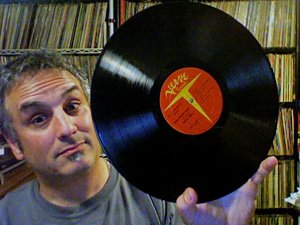It’s the time of year for saving money!
You know, folks… we’ve sure lost a whole lot of famous people this year. Sad as that has been, there is so much to be grateful for from amazing talents still making fine music.
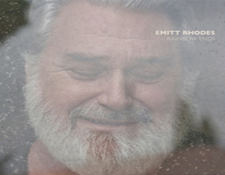 Embracing that glass-half-full attitude, there are many cultural icons we need to support while we’re all here… Topping a category I’m calling ‘It ain’t over ’til its over!’ is a man named Emitt Rhodes (an underdog artist I’ve been a fan of since I was about 9 or 10 years old).
Embracing that glass-half-full attitude, there are many cultural icons we need to support while we’re all here… Topping a category I’m calling ‘It ain’t over ’til its over!’ is a man named Emitt Rhodes (an underdog artist I’ve been a fan of since I was about 9 or 10 years old).
Mr. Rhodes is beginning a long awaited comeback this year.
By “long awaited” I am referring to myself and Emitt’s many thousands of fans who have discovered his music over the years (some via the movie The Royal Tennenbaums). I have had Emitt Rhodes’ eponymous first album since 1970, the same year I got Paul McCartney’s solo debut. Like Macca’s album, Emitt’s oft-compared record wow’d many with his self-produced genius — he played all the instruments and sang all the vocals on his first albums. I’ve given copies of Emitt’s debut album to many friends who like all things Beatles, Beach Boys and sunshine infused pop.
According to the Wiki, the album reached #29 on the Billboard charts — it was a Top 40 hit! Yet, what should have amounted to an enormous career fell victim to the rough and tumble music industry of the late 60s and early 70s. Emitt’s tale is well documented (there is even a film about him — which I’ve yet to see — called “The One Man Beatles”). In short, Emitt Rhodes was a wunderkind of the mid-60s LA pop scene, putting out fine pop-rock recordings, particularly with his band The Merry-Go-Round, and writing songs that would become hits for Fairport Convention and (later) The Bangles. Fast forward to 1970, Emitt secured a high profile but ridiculously demanding recording contract with a then big record label. This is where the ugly industry problems began, resulting in commercial mayhem despite critical acclaim for his debut. Emitt is eventually sued by his label, bows out of his recording career and endures numerous other nasty life woes… And this is just the super abridged sub-Readers Digest version of his story.
C’mon universe, cut this guy some slack already!
Fast forward in 2016 and that break seems to be happening finally as we have some incredibly good news to share with you, Dear Readers: the fine folks at Omnivore Records are releasing a brand new Emitt Rhodes record, his first full album since 1973! Beyond the few songs that have burbled up in recent years — including a Record Store Day-only single release of his fine (and painfully apropos) cover of The Bee Gees’ “How Can You Mend A Broken Heart” — this is the first NEW complete Emitt Rhodes album since his then swan song, Farewell To Paradise.
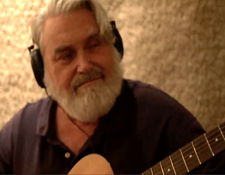 Now, before listening to this new album — called Rainbow Ends — I was momentarily surprised by the press release where, Producer Chris Price is quoted saying: “I view this as a continuation album, meaning it isn’t meant to be recreating the sound from his first record, but instead what he might have sounded like after his third album, Farewell To Paradise, if he kept making music in the mid-to-late ’70s.”
Now, before listening to this new album — called Rainbow Ends — I was momentarily surprised by the press release where, Producer Chris Price is quoted saying: “I view this as a continuation album, meaning it isn’t meant to be recreating the sound from his first record, but instead what he might have sounded like after his third album, Farewell To Paradise, if he kept making music in the mid-to-late ’70s.”
After considering his comment, I realized this approach to a new Emitt Rhodes album is a stroke of genius because it would be next to impossible to recreate the sound of Emitt’s debut. That sound would instantly time-stamp the music as late-60s Beatles-esque — not a bad thing, but ultimately limiting in its audience appeal. Whereas, aligning the new music as a follow on to the last LP marks a clear transition point where fans old and new can pick up on Emitt’s story both thematically and sonically.
Also, there is a large audience for mid-70s music these days, what with the whole Yacht Rock phenomenon and resurgent interest in bands like Fleetwood Mac and The Eagles.
So, you might wonder, what defined the sound of mid-70s MOR (ie. Middle of the Road) pop-rock records? Well, first off there was no auto-tune. There was no Pro Tools digital recording and while multi-track analog tape recording enabled overdubs, mostly records were still mostly made via the time-tested practice of placing the core band together live in the studio — capturing actual performances.
Mix wise — especially on singer-songwriter records — vocals were king, often times presented fairly “dry,” sometimes double tracked for thickness, often without much in the way of processing or special effect. Drums are all readily audible on these records yet they are usually tucked toward the back of the mix, especially cymbals; snare drums are not as in your face and generally the drums sound pure, like live drums — no looping pre-produced samples back then, folks. If you really wanted to rock out while listening to James Taylor’s “Your Smiling Face,” you really needed to turn up your amplifier good ‘n loud (which a lot of audiophiles did back in the day) to push some air from your speakers.
Mid 70s bass is mostly centered on the low frequencies — very little in the way of bouncy finger poppin’ on the high strings going on in early to mid-70s pop records. Again, all the parts appear distinct but as a backdrop for the vocals and the artist’s primary instruments — in this case piano and guitars. Out of curiosity I popped on some mid-70s LPs by Seals & Crofts (“Diamond Girl”), Andrew Gold (“Lonely Boy”) and Harry Chapin (“WOLD”) to spot check if my memory was right with regard to that sound — those recordings all take that sort of mix approach.
For the most part, it is a sonic presentation that kinda went out the window for hit-makers by the 1980s. So when you hear Rainbow Ends, remember that it is intentionally picking up — sonically — at around 1974 or thereabouts.
Its a cool thing and ultimately the result is that Rainbow Ends sounds quite timeless…
]]>Rainbow Ends is also something of a continuation lyrically. While not really a concept album, there seems to be a sense of Emitt coming full circle in life, putting past challenges in perspective and moving on. Where parts of Farewell To Paradise felt something akin to a message in a bottle tossed from a sinking ship — consider the startling cries for help like “Holy Jesus things have all gone wrong, Everything is spinning way too fast” (“Shoot The Moon”) — Rainbow Ends finds our hero surviving, crawling up onto the shore, battered but seemingly ready for what comes next.
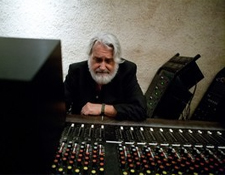 On Rainbow Ends, Emitt opens up with the biographical “Dog On a Chain” and over the course of the next 35 minutes proceeds to present many life dramas (“If I Knew Then,” “Its All Behind Us Now,” “Isn’t It So,” “This Wall Between Us,” “Someone Else”). “Put Some Rhythm To It” provides something of a much needed wry comic breather: “If you want to learn to dance, and if you want to find romance, all you got to do is shake your ass, and put some rhythm to it.”
On Rainbow Ends, Emitt opens up with the biographical “Dog On a Chain” and over the course of the next 35 minutes proceeds to present many life dramas (“If I Knew Then,” “Its All Behind Us Now,” “Isn’t It So,” “This Wall Between Us,” “Someone Else”). “Put Some Rhythm To It” provides something of a much needed wry comic breather: “If you want to learn to dance, and if you want to find romance, all you got to do is shake your ass, and put some rhythm to it.”
Perhaps the most heartwarming thing about Rainbow Ends is how it sounds so purely like Emitt Rhodes –not his influences. He has fine tuned his own voice (the direction he was going on Farewell to Paradise). Not that those recordings with The Merry Go Round and his first solo album were derivative. No, all those wonderful Beatle-y pop influences he showcased so proudly then are just now more deeply ingrained.
You all out there in audiophile land should know that I am reviewing this off the advance CD edition of Rainbow Ends. I’m still waiting for the vinyl pressing I pre-ordered via the Pledgemusic program. From a promotional video I saw on the Internet, there are scenes in the studio showing this was probably recorded digitally (on a Mac even).
This isn’t a slam, mind you. Actually, its a complement because this nice mellow singer songwriter-y flavored recording doesn’t sound particularly harsh or digital. Even when you turn it up loud, there is a remarkable warmth that comes across.
I’ll put it this way: when I play this album up loud on my stereo, it doesn’t hurt my ears (something that happens with many poorly made/mastered digital recordings).
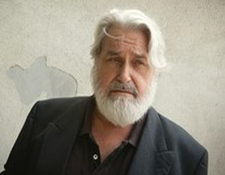 Surprisingly, and thankfully, it also does not sound particularly like any of the artists who are backing Emitt on it which includes: Roger Joseph Manning Jr. and Jason Faulkner (Jellyfish), Joe Seiders (New Pornographers), Aimee Mann, Susanna Hoffs (Bangles), composer/producer Jon Brion, Nels Cline & Pat Sansone (Wilco) and, from Brian Wilson’s band, Probyn Gregory & Nelson Bragg.
Surprisingly, and thankfully, it also does not sound particularly like any of the artists who are backing Emitt on it which includes: Roger Joseph Manning Jr. and Jason Faulkner (Jellyfish), Joe Seiders (New Pornographers), Aimee Mann, Susanna Hoffs (Bangles), composer/producer Jon Brion, Nels Cline & Pat Sansone (Wilco) and, from Brian Wilson’s band, Probyn Gregory & Nelson Bragg.
Nope. Rainbow Ends sounds just right, like an Emitt Rhodes album in 2016 should sound.
“This Wall Between Us” is a near epic.
The final cut and title track is a tear jerker:
“I wanna be loved no matter what
Not just for now
Till better’s got
I wanna be someone’s only one
Not just for now
Till better comes
Always chasin’ rainbow ends
Head up in the clouds
Thought my dreams would never end
But my eyes they’re open now”
What else can I say? Welcome home Emitt. Your fans and friends have got your back.
Keep following your dreams.
